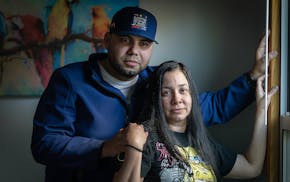At the State Capitol, University of Minnesota researchers joined hundreds to rally against Trump's proposed cuts to federal grants for medical research.
A week later in March, faculty and students with tape covering their mouths protested a resolution limiting who can officially speak for the U, saying it will curtail academic freedom.
Then, a U graduate student was detained by federal officials, one of at least 50 international students across Minnesota who have been arrested and had their visas revoked or immigration statuses terminated for offenses as minor as a speeding ticket.
Through a flurry of executive orders and letters, President Donald Trump has laid siege to higher education across the country in the first few months of his second term, attacking longstanding practices and funding sources.
In Minnesota, the chaotic roll-out of changes and cuts — and then reversals in some decisions — has left college leaders scrambling. Many of Trump's initiatives remain tied up in courts.
While efforts to undermine Ivy League schools like Columbia University and Harvard University have drawn the most attention, the strain is affecting schools big and small across Minnesota, officials said, with the University of Minnesota's Twin Cities campus at the center of the storm.
"It's perhaps not easy for people outside higher ed to recognize the degree to which attacks on individual institutions feel like an attack on all institutions," said Alison Byerly, president of Carleton College in Northfield. "You don't know why particular schools have been targeted ... and so that does create a climate in which everyone is uncertain of how they might be impacted."
Many institutions have been stuck in an "anxious waiting mode," making it hard to know what to do, she said, comparing it to shadowboxing with an unknown opponent.
At Augsburg University in Minneapolis, President Paul Pribbenow said simply keeping track of the countless federal changes is a challenge, and can distract leaders from their work teaching students.
"We are educating students ... so they can go and make a good living supporting their families, give back to their communities," Pribbenow said. "And the narrative we hear out of Washington is that we're a bunch of woke, elitist, non-accountable institutions."
Minnesota has a robust higher education system — from the U, a land grant institution, to a network of state colleges and universities, and numerous private schools. They employ thousands of people and pump millions of dollars into the economy.
Some schools are starting to fight back. At the U on Thursday, the University Senate approved the creation of a "mutual defense compact" so the Big Ten's 18 schools can unite against Trump's attempts at interference.
The resolution requested that U President Rebecca Cunningham propose and help establish the compact. It's unclear whether she will do so. She declined an interview request with the Minnesota Star Tribune.
Another show of unity came last week as more than a dozen Minnesota presidents joined nearly 500 leaders nationwide in signing a letter opposing the "unprecedented government overreach" since Trump took office.
Trump's actions have contributed to a more challenging atmosphere for students — and the stress is palpable.
"[It] brings about an air on campus that is not quite as positive or collaborative as the prior years," said Mario Bertogliat, a medical student set to graduate, adding that international students working in his lab are "pretty scared."
Cracking down on diversity
During Trump's first days in office, he issued an order banning all diversity, equity and inclusion (DEI) programs within the federal government, calling them discriminatory.
At the U, Cunningham affirmed the school's commitment to DEI programs and said the U wasn't rolling back any programs.
In February, though, the U law school paused hiring an assistant dean of diversity, equity and inclusion.
Trump's administration has named the U among dozens of institutions under investigation for bias against white and Asian students. The same investigation also listed the U as one of seven schools being looked at for "alleged impermissible race-based scholarships."
In a statement, a U spokesperson said the school would fully cooperate with any investigation and remained committed to a discrimination-free environment.
In St. Paul, the University of St. Thomas lost millions of dollars in two federal grants deemed DEI initiatives, but after two lawsuits were filed, a court order restored funding. The U also received one of the grants, which was reinstated.
At Augsburg, Pribbenow said officials have made changes in scholarship criteria in response to Trump's letter and orders.
Trump's policies have also challenged campus diversity in another way, targeting international students. On Friday, the government reversed course, saying it will reinstate visas for students whose statuses were stripped over minor infractions.
At Columbia, a graduate student who participated in pro-Palestinian protests on campus was detained. Some of Minnesota's 15,000 international students said they now live in fear of leaving their apartment or traveling to their home country. School officials have warned them to "keep their head down," delete social media accounts and not engage in protests. Some students are pursuing federal lawsuits. And some have self-deported.
That means local campuses may lose international students in years to come.
"These students, who call Minnesota their home away from home, bring a vibrancy to campus and add a global perspective to class discussions," Scott Olson, chancellor of Minnesota State, said in a statement. "Unfortunately, we may have far fewer international students in the future because these policy changes feel so inhospitable."
Antisemitism, protests and free speech
After the 2023 Hamas attack on Israel, protests and encampments spread to campuses nationwide, including at the U.
Trump has vowed to fight antisemitism and punish pro-Palestine student protesters. In February, Trump told five universities, including the U, that they were under investigation for antisemitism. The same week, federal officials said they were forming an antisemitism task force.
U officials said in a statement that they were confident in their approach to combating hate and bias and would fully cooperate.
Cunningham wrote that the U had recently joined the Hillel Campus Climate Initiative — an effort to ensure Jewish students feel comfortable at school — and over the last year substantially improved its response to bias, making it easier to report.
There are more than two sides to the issue, said Brandon Wagenfeld, a member of Tzedek, a Jewish student group at the U. Antisemitism concerns are valid, but he doesn't want antisemitism to justify hampering freedom of speech and academic freedom on campus.
He's participated in pro-Palestine protests, he said, and doesn't want situations where Jewish students are uncomfortable to be confused with antisemitism. By taking a punitive approach against protesters, the U "makes it hard to have conversations about the difference," he said.
In March, Trump's administration announced a second antisemitism investigation at 10 schools, including the U. A U spokesperson said he was "not immediately aware" if federal officials have visited campus.
The campus protests have also reinvigorated old debates about the lines between free speech and making sure students feel safe.
In March, the U's Board of Regents passed a resolution limiting "institutional speech" — who can officially speak for the U and what issues they can address. It came after two dozen lawmakers had requested that statements, several of which were pro-Palestine, be removed from the U's website.
Several regents said they didn't believe the resolution infringed on faculty's ability to teach, say or publish what they want. Regents Chair Janie Mayeron said allowing public statements by groups puts the U at risk.
Inside Higher Ed estimates that more than 140 universities have implemented institutional neutrality policies. A U spokesperson noted that the process leading to the final resolution started years ago, and "predates the current administration."
Since then, U officials have taken down a number of statements from the official website. In April, Howard Louthan, a U history professor, resigned from his role as director of the Center for Austrian Studies to protest the removal of a pro-Ukraine statement on the center's website. He called the removal "thoughtless and cruel" to the Ukrainian community.
Slashing budgets
Trump has also made massive budget cuts, including slashing National Institutes of Health (NIH) grant funding to medical centers and universities, impacting scientific research.
Trump cut reimbursement for "indirect costs" related to NIH grants to 15% of their value. The U was previously receiving more than three times that amount for expenses like research staff or computer equipment.
The reductions could cost the U more than $100 million, though a judge has temporarily blocked the cuts.
U professors were told that NIH funding for the Institutional Research and Academic Career Development Award program would be cut. The program supports postdoctoral scholars as they teach community college and complete scientific research with students.
The $660,000 grant funded six postdoctoral positions a year, aiming to diversify the professorate, officials said.
"It is very disappointing," said David Greenstein, a professor and the grant's project director. "[Community college students'] lives are changed by this."
Logan Spector, a professor who runs an NIH-funded training program related to pediatric cancer research, said the delayed decision of whether to fund the program meant he had to reject this year's applicants.
"This will be a lost year for graduate science education," he said.
Colleges like Carleton, which send many students to graduate school, will also be affected by the cuts, Byerly, the college's president, said.
Trump later tore into budgets for the National Endowment for the Humanities (NEH) and the Institute of Museum and Library Services. Between 2019 and 2023, the NEH awarded nearly $15 million to Minnesota organizations. Last year, the state received more than $4.7 million in IMLS grants.
Carleton lost a $50,000 NEH grant, Byerly said.
At the U, the Wangensteen Historical Library lost a $100,000 grant to digitize its collection of about 50 flap anatomy books. A cross between pop-up cards and paper dolls, the books, some of them 500 years old, show how human anatomy works.
"They create, individually, openings to have discussions about various historical topics," said Emily Beck, the collection's associate curator, adding that the impact of Trump's cuts seems greater than the amount of money saved.
Outside the library, Paola Azuaje, a neuroscience major, said she's affected by all of the changes because she works at a U lab that receives NIH grants.
"We've been having meetings of grants being cut and ... reallocating money to fund the most important things," she said. "It's kind of concerning because I want to work in a lab."

Trump says US Steel will keep HQ in Pittsburgh in a sign he'll approve bid by Japan-based Nippon

Authorities, family identify man fatally shot by Coon Rapids police during reported domestic

Planned Parenthood North Central States to lay off 66 workers, restructure presence in Minnesota

Roper: Let's celebrate improvements to the local bus
